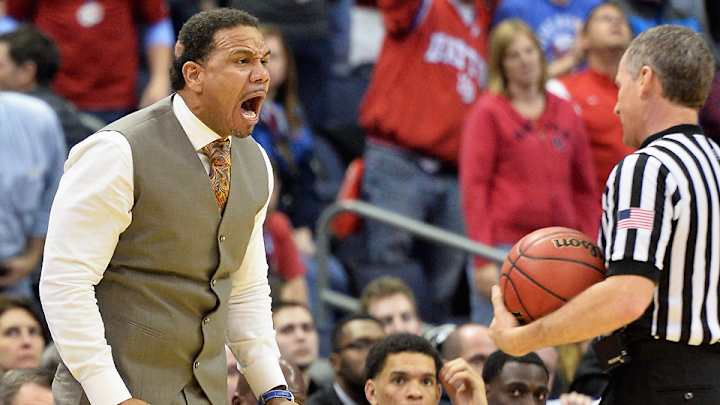Ed Cooley, Providence left bitter after testy 'neutral-site' loss to Dayton

COLUMBUS, Ohio – As the lead piled up in the final minutes and No. 11 seed Dayton cruised to Friday's only NCAA tournament upset over No. 6 Providence, the din rang through Nationwide Arena in Columbus. “Let’s go Flyers, (clap clap, clap clap clap), Let’s Go Flyers.”
On a bizarre NCAA tournament day when the first 15 games were won by the higher seed, the final contest of the day ended at 1:10 a.m. local time and featured a fitting twist. The underdog had all the characteristics of a favorite, as 90-percent of the arena sang, chanted and roared for the Flyers on their way to a 66-53 win. “Neutral site,” Providence coach Ed Cooley said when asked about the setting. “Neutral site.”
Not only did the Flyers have a distinct homecourt advantage, but they also were delivered favorable whistles all night. That included the game’s most glaring play — a technical foul on Cooley with 3:42 remaining that sealed the game for the Flyers. The technical came during a timeout, when Cooley slammed over a chair in the middle of his team’s huddle in frustration. He’d been chirping at the referees already, and knocking over the chair resulted in a technical foul that bumped Dayton’s lead to nine and started a run that didn’t end until the Flyers led by 14. Providence didn’t have much of a chance to win before the technical, and it had no chance to win after it. “Me personally, I’m a character guy,” Cooley said. “That to me was wrong in my opinion. I’m coaching my team.” When asked whether he was wrong or the official, Cooley responded, “Both, apparently.”
NCAA coordinator of officials John Adams released a statement – at the timely hour of 1:57 a.m. – that said Cooley’s act of hitting over the chair violated “bench personnel committing an unsportsmanlike act.” Cooley’s argument was that he was trying to coach his team, and hitting the chair wasn’t directed at an official or his call. Common sense sides with Cooley.
From the 10:45 p.m. tip time to the unlikely homecourt advantage to the questionable call, the nightcap in Columbus left everyone needing a nightcap. The pro-Dayton crowd was drunk with glee, as they recovered from being vastly under-seeded at No. 11 to win its First Four game, outlast Providence and move on to play No. 3 Oklahoma for a spot in the Sweet 16. The pro-Dayton setting on Friday will surely lead to an off-season of grousing in Rhode Island, which on Friday night started with Cooley saying a lot without saying much at all. “I’m going to stick with the term that this was a neutral setting,” he said. “Extremely neutral.” When I told Cooley that it didn’t feel neutral, he snapped back, “That’s your opinion.”
In beating Indiana, Wichita State gets what it's wanted all along: Kansas
Dayton’s Dyshawn Pierre led all scorers with 20 points, and Jordan Sibert scored 15 on just 3-for-12 shooting. Providence’s LaDontae Henton delivered a brutal shooting line, 7 for 26, in his final game as a Friar. But the crooked statistic that they’ll long remember in Providence, a place where fans are notoriously hard on referees, is the final free throw statistics. Dayton shot 30 free throws and Providence shot just seven. Dayton had 14 trips to the free throw line before Providence attempted a free throw. When asked about the disparity, Cooley reiterated: “Neutral site.”
Let’s make one thing certain. Dayton played vastly better than Providence. The Friars came out tentative on offense, handcuffed by two early fouls by star Kris Dunn and sleepwalked through much of game in which they shot 33.9%. Fitting since it started around 11 p.m., a tip time that should embarrass NCAA officials, as the West Coast games three time zones away tipped off and finished much earlier. Someone dock the salary of the genius television executive that decided Providence and Dayton needed to play long past midnight while the West Coast games were long completed.
Dayton had a lot to do with Providence’s misery, as the Flyers have won five NCAA tournament games in the past two seasons and are still chugging despite playing five games in the past eight days. And while Cooley deflected questions about the obvious advantage Dayton held, Flyers coach Archie Miller embraced them. “It feels like a home game for us,” he said. “It’s an incredible feeling.”
Homer Drew and sons experience the other side of March Madness
The odd setting, free throw disparity and technical on Cooley capped off a lackluster day in Columbus. In three of the four games in Columbus on Friday, officiating was a prominent storyline. In No. 12 Buffalo’s loss to No. 5 West Virginia, Bulls coach Bobby Hurley drew the unfortunate assignment of official Wally Rutecki, who had given technical fouls in the Atlantic 10 Tournament and NIT to Hurley's brother, Rhode Island coach Dan Hurley. Rutecki made perhaps the game’s worst call when he whistled a phantom off-ball foul with game tied, 2:10 remaining and just seven seconds left of the shot clock. Devin Williams hit two free throws and the Mountaineers never trailed again. In the second game of the day, official Brian Dorsey swallowed the whistle on a Valparaiso 3-point attempt that could have tied the game. In the game book, it goes down as a turnover by Valpo’s Keith Carter. But the reality is that Maryland walk-on Varun Ram clearly hacked Carter’s arm, and Dorsey ran off the court instead of awarding Valparaiso three free throws that could have tied the game.
And while Dayton advances because it played better, the whole day felt off. And it’s hard to blame Cooley for not feeling neutral about how things played out at UD Arena – er, Nationwide Arena – on Friday night.
